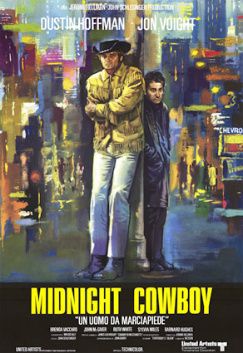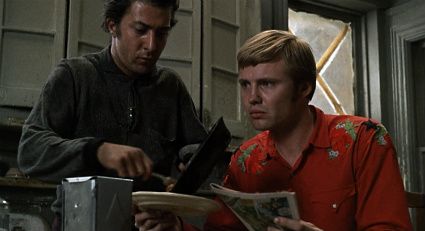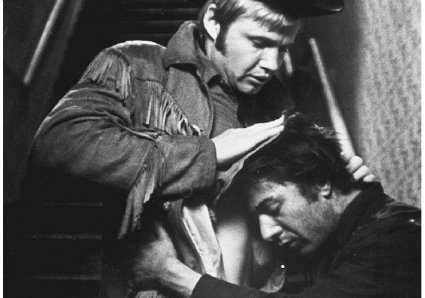Midnight
Cowboy (repost from my previous site)
1969
Director: John Schlesinger
Starring: Jon Voight, Dustin Hoffman
Notable
as the first and only X-rated film to win Best Picture (there, I’ve said it,
obligatory historical context mention done), Midnight Cowboy is
typical of American films coming out of the late 60s and 70s. A personal, character-driven drama with a
decidedly downbeat turn, this is not a film to watch if you want cheering up.
Joe
Buck (Voight) is a Texas good ole boy who dreams of striking it rich in The Big
Apple. Deciding that he’ll be able to
make it as a hustler (re: male prostitute), he journeys across the country only
to realize pretty quickly that he is not accustomed to city life. He gets taken in by the aptly nicknamed
‘Ratso’ Rizzo (Hoffman) who promptly cons twenty bucks off Joe then abandons
him. Eventually, however, Ratso takes
Joe under his wing and helps him survive in the harsh city. Both dream of better days, better times,
better places. Needless to say, this
being an American drama from the late sixties, their dreams are never realized.
The
performances are easily the main attraction in Midnight Cowboy. Voight takes Joe, a naïve prostitute, and
turns him into much more than a two-dimensional caricature. Joe is over-confident and arrogant, but
watching him realize his dreams are crumbling is very sad. And yet, Joe manages to maintain some pluck
and positivity along with a profoundly caring personality despite all the
stones that life throws at him. When he
finally throws away his cowboy boots at the end of the film, there is an
overpowering sense of a boy who has been forced, against his will, to grow into
a man.
Schlesinger,
the director, uses a wonderful technique to give us background information on
Joe Buck. Instead of traditional
flashbacks, he uses flashback montages, for lack of a better term. Every now and then, Joe starts thinking about
his life thus far in a nonlinear manner.
He recalls one memory which then prompts his recollection of a different
memory from a completely different time.
We cut back and forth between Joe as a young child and Joe as a
teenager, all in one very fast clip.
What I love most about these montages is how they very slowly and very
indirectly reveal things about Joe’s past.
We are left to piece together certain details. Highly significant events are not spelled out
in painstaking detail; rather, Schlesinger trusts his audience to get the gist
without beating us over the head with it.
Hoffman
is, as always, great in his portrayal of Ratso Rizzo, but not for the base
characterization. Rizzo is a cripple, an
outcast, a rat who has learned how to live on the scraps of society. Hoffman’s physical performance and nasal
voice creep to the precipice of ridiculous stereotype, but he manages to pull
back at the very last moment, creating a surprisingly nuanced character. Rizzo is, sadly, very real. Unblinkingly, he takes a funeral wreath from
a neighboring headstone and drops it at his father’s grave. Joe looks judgmental. Rizzo never flinches or looks
apologetic. He wants his father to know
that he was there. He gets annoyed at
Joe for buying medicine for him when he could just as easily have pinched
it. And when his sickness grows worse,
he shakily admits to Joe that he wet his pants.
So far from cartoon stereotype.
The
relationship between Joe and Rizzo is clearly the central relationship of the
film, and it is a complicated one. Joe
is a male prostitute – there’s no escaping the sexuality there. But Joe is a bad male prostitute; in his very
first outing, after finally finding a rich Park Avenue honey, she starts crying
when he asks for the money and he winds up paying HER twenty dollars. He is also forced to take a few male clients,
making his personal sexuality vague. It
is this that drives the ambiguity of the relationship between Joe and
Rizzo. Is Joe in love with Rizzo? Is Rizzo in love with Joe?
To
me, that question is answered with a single still from the film. Joe and Rizzo are invited to an Austin
Powers-esque party (an Andy Warhol scene that feels jarringly out of place in
the film). At the bottom of the stairs,
before they head up to the party, Joe looks at Rizzo. “We have to clean you up,” he says. Joe has been laundered, washed, and shaved by
Rizzo so that he is more appealing to women; Rizzo, on the other hand, reeks of
the squalor in which they have been living.
Joe untucks his own shirt and uses it to clean off the top of Rizzo’s
head. Rizzo, for his part, leans in and
lets Joe clean him.
Look
at Rizzo in this shot. What strikes me
about this is how Rizzo is positioned.
He doesn’t just sit there and let Joe wipe his forehead. He leans in, then puts his arm around Joe’s
waist. Look at the expression on
Hoffman’s face. It is peaceful, content;
it is as if Rizzo is thinking, “This.
This is what I want.”
This
scene epitomizes this film to me. It
sums everything up. These are two
disparate characters living in abject poverty; they are dirty, they are filthy,
they are unsuccessful. But they have
each other. It is achingly poignant, the
look on Hoffman’s face. This is a
phenomenally quick scene, a throwaway scene, but it’s my personal key to the
film. Others will interpret the
relationship in other ways, but this one sadly beautiful image sums up my take
on it. Rizzo is very much in love with
Joe, but doesn’t know what to do about it.
He finds a tiny moment of happiness here.
As
much of a downer as this film is, there are surprising moments of humor and
lightness as well. In particular, a
dream sequence of Rizzo’s, imagining a luxurious life in Miami with rich women,
is downright funny. I love how, even in
his own fantasy, Rizzo is cooking for others.
Midnight
Cowboy is
not the greatest example of American filmmaking from its era, but the pair of
incredibly strong performances easily make it worth seeing. It’s worth watching to remember that there’s
much more to Jon Voight than Transformers.
Arbitrary
Rating: 7.5/10



I liked this movie quite a bit when I saw it many years ago, but it's not the kind of film I've ever wanted to see a second time. It's a downer.
ReplyDeleteMy personal opinion of their relationship is that it was neither sexual or romantic, but rather parent/child with each taking turns being the parent when the other needed it.
I like the parent/child angle. I hadn't thought of that, but you're certainly right.
DeleteI agree this isn't a "watch it over and over again" movie, at least not for me. It's TOO depressing. Life sucks, then you die. Literally. The worst, though, is that one teeny tiny faint ray of hope that we get at the end - and then NOPE! Just when you think things are finally turning around for our pair, we get the punch to the gut.